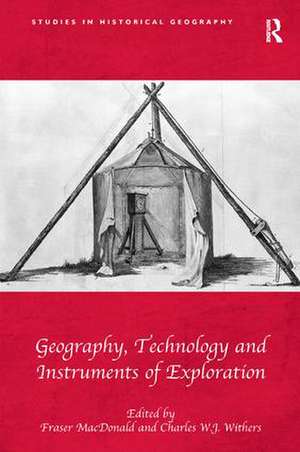Geography, Technology and Instruments of Exploration
Autor Fraser MacDonald, Charles W.J. Withersen Limba Engleză Hardback – 28 noi 2015
| Toate formatele și edițiile | Preț | Express |
|---|---|---|
| Paperback (1) | 312.43 lei 6-8 săpt. | |
| Taylor & Francis – 12 feb 2018 | 312.43 lei 6-8 săpt. | |
| Hardback (1) | 768.30 lei 6-8 săpt. | |
| Taylor & Francis – 28 noi 2015 | 768.30 lei 6-8 săpt. |
Preț: 768.30 lei
Preț vechi: 1105.19 lei
-30% Nou
Puncte Express: 1152
Preț estimativ în valută:
147.03€ • 152.94$ • 121.38£
147.03€ • 152.94$ • 121.38£
Carte tipărită la comandă
Livrare economică 14-28 aprilie
Preluare comenzi: 021 569.72.76
Specificații
ISBN-13: 9781472434258
ISBN-10: 1472434250
Pagini: 282
Dimensiuni: 156 x 234 x 24 mm
Greutate: 0.68 kg
Ediția:1
Editura: Taylor & Francis
Colecția Routledge
Locul publicării:Oxford, United Kingdom
ISBN-10: 1472434250
Pagini: 282
Dimensiuni: 156 x 234 x 24 mm
Greutate: 0.68 kg
Ediția:1
Editura: Taylor & Francis
Colecția Routledge
Locul publicării:Oxford, United Kingdom
Public țintă
Postgraduate and UndergraduateCuprins
Contents: Preface; Introduction: geography, technology and instruments of exploration, Fraser MacDonald and Charles W. J. Withers; Equipping expeditionary astronomers: Nevil Maskelyne and the development of 'precision exploration', Rebekah Higgitt; Instrumenting order: longitude, seamen and astronomers, 1770-1805, Eoin Phillips; North by northwest? Experimental instruments and instruments of experiment, Richard Dunn; Weather instruments all at sea: meteorology and the Royal Navy in the nineteenth century, Simon Naylor; Objects of exploration: expanding the horizons of maritime history, Claire Warrior and John McAleer; Instruments of exploration in National Museums Scotland, A.D. Morrison-Low; 'Instruments in the hands of others': the life and liveliness of instruments of British geographical exploration, c.1860-c.1930, Eugene Rae, Catherine Souch and Charles W.J. Withers; Seismic instruments, geographical perspectives, Deborah Jean Warner; Aerial photography in geography and exploration, Peter Collier; Uncovering camouflage: the technology of location and the craft of erasure, Isla Forsyth; Instruments of science and war: Frank Malina and the object of rocketry, Fraser MacDonald; UK radar (dis)integration in the 1960s: linesman/mediator radar development and the calculus of nuclear deterrence, Graham Spinardi; Index.
Notă biografică
Fraser MacDonald is Lecturer in Historical Geography at the University of Edinburgh. He is currently working on a book-length history of rocketry in the mid twentieth century, in which the placing of instruments in outer space is a key episode. He co-edited Observant States: Geopolitics and Visual Culture (I B Tauris, 2010) with R. Hughes and K. Dodds. Charles W.J. Withers is Ogilvie Professor of Geography at the University of Edinburgh. He is the author of nine research monographs including Geography, Science and National Identity: Scotland since 1520 (Cambridge, 2001), Placing the Enlightenment: Thinking Geographically about the Age of Reason (Chicago, 2007), and Geography and Science in Britain, 1831-1939: A Study of the British Association for the Advancement of Science (Manchester, 2010), and co-editor of a further eight volumes. His co-authored Scotland: Mapping the Nation (Birlinn, 2011) won the Saltire Society Research Book of the Year in 2012.
Recenzii
’Inquisitive scientific travellers have long depended on robustly reliable hardware to turn their remarkable experiences into convincing reports. This impressive collection makes sense of how such devices work and offers a major challenge to images of the solitary voyagers of past sciences. The book is stocked with revealing stories of these mobile instruments' very wide range of uses, tales of frustration and improvisation as well as of triumph and success.’ Simon Schaffer, University of Cambridge, UK ’The story of scientific exploration has often been reduced to the heroism, or duplicity, of explorers. In this book, it is instead the instruments of science that are centre-stage, from the humble compass to the space-age rocket. Through a variety of studies of technology, both as used and as imagined, this book opens a new chapter in the historical geography of science.’ Felix Driver, Royal Holloway, University of London, UK ’Traditional histories of scientific exploration are typically only about humans; their often epic bodily exertions, and mental breakthroughs. This excellent collection of essays rightly shifts the emphasis to the role of material things: devices, instruments, machines, tools, books of tables, photos, and clothing. None are mere background props. Instead, they are the very stuff of scientific exploration.’ Trevor Barnes, University of British Columbia, Canada
Descriere
The collection brings together scholars in the history of geographical exploration, historians of science, historians of technology and, importantly, experts with curatorial responsibilities for, and museological expertise in, major instrument collections. Ranging in their focus from studies of astronomical practice to seismography, meteorological instruments and rockets, from radar to the hand-held barometer, the chapters of this book examine the ways in which instruments and questions of technology - too often overlooked hitherto - offer insight into the connections between geography and exploration.
